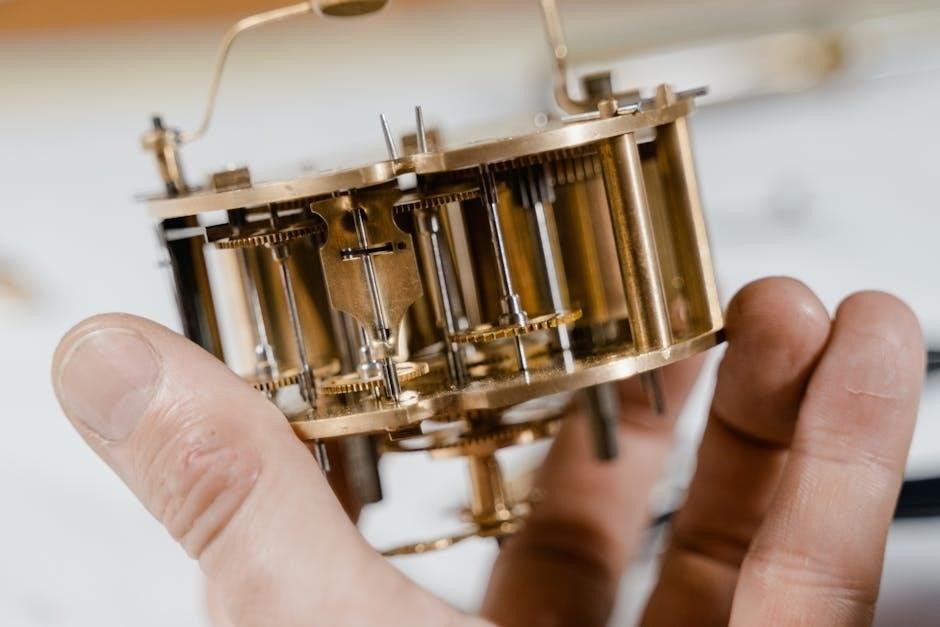The Hormone Repair Manual by Dr. Lara Briden offers a comprehensive guidebook for women navigating perimenopause and menopause‚ providing natural solutions and expert-backed strategies for symptom relief and hormone balance.
What is the Hormone Repair Manual?
The Hormone Repair Manual is a comprehensive guidebook authored by Dr. Lara Briden‚ a naturopathic doctor‚ designed to help women navigate the challenges of perimenopause and menopause. This practical manual focuses on natural approaches to hormone balance‚ offering strategies such as dietary changes‚ nutritional supplements‚ and lifestyle modifications. It emphasizes the importance of understanding hormonal changes and provides evidence-based solutions to alleviate symptoms. The book is particularly geared toward women in their 40s‚ 50s‚ and beyond‚ aiming to empower them with knowledge and tools for optimal health during this transitional phase of life.

Understanding Perimenopause and Menopause

Perimenopause and menopause are natural transitions marking the end of a woman’s reproductive phase‚ characterized by hormonal shifts‚ leading to various physical and emotional symptoms.
Common Symptoms of Perimenopause and Menopause
Perimenopause and menopause often bring a range of symptoms due to hormonal fluctuations. Common experiences include hot flashes‚ night sweats‚ mood swings‚ and irregular periods. Many women also report fatigue‚ weight gain‚ and changes in libido. Additionally‚ sleep disturbances and cognitive fog are frequently noted. Vaginal dryness and mood instability can significantly impact daily life. These symptoms vary in severity and duration‚ with some women experiencing mild discomfort while others face debilitating effects. Understanding these signs is crucial for seeking appropriate support and relief‚ as outlined in the Hormone Repair Manual.
The Causes of Hormonal Imbalance During Menopause
The primary cause of hormonal imbalance during menopause is the natural decline in estrogen and progesterone production by the ovaries. As women age‚ the ovaries gradually stop producing these hormones‚ leading to fluctuating levels. This hormonal shift triggers various symptoms and disrupts the body’s equilibrium. Additionally‚ other hormones‚ such as testosterone‚ may also experience changes‚ contributing to overall imbalance. Lifestyle factors‚ including diet and stress‚ can exacerbate these hormonal fluctuations. Individual differences in how women’s bodies adapt to these changes can lead to varied symptom severity. Genetic predispositions may also play a role in how hormonal imbalances manifest during menopause.
Importance of Early Diagnosis and Intervention
Early diagnosis and intervention are crucial for managing perimenopause and menopause symptoms effectively. Identifying hormonal imbalances early allows for timely treatment‚ reducing the risk of long-term health complications like osteoporosis and cardiovascular issues. Early intervention can also alleviate symptoms such as hot flashes‚ mood swings‚ and sleep disturbances‚ improving quality of life. Prompt action enables personalized treatment plans‚ including dietary changes or supplements‚ to restore hormone balance. Delaying diagnosis may lead to more severe symptoms and prolonged discomfort. By addressing hormonal changes early‚ women can maintain their health and well-being throughout this transitional phase.
Natural Approaches to Hormone Repair
Natural approaches focus on diet‚ nutritional supplements‚ and lifestyle modifications to restore hormone balance and alleviate symptoms without synthetic interventions‚ promoting long-term health and well-being.
Dietary Changes for Hormone Balance
Dietary changes play a crucial role in hormone repair by focusing on whole‚ nutrient-dense foods that support hormone production and balance. Incorporating foods rich in healthy fats like avocados‚ nuts‚ and olive oil‚ along with vegetables and lean proteins‚ helps stabilize hormones. Reducing sugar intake and avoiding processed foods can prevent insulin spikes‚ which disrupt hormone function. Additionally‚ including hormone-supportive nutrients like vitamin D‚ magnesium‚ and omega-3 fatty acids can enhance overall hormonal health. By making these dietary adjustments‚ women can create a foundation for natural hormone repair and alleviate symptoms associated with perimenopause and menopause.
Role of Nutritional Supplements in Hormone Health
Nutritional supplements play a supportive role in hormone health by addressing deficiencies and promoting balance. Key supplements like magnesium‚ omega-3 fatty acids‚ and vitamin D help regulate hormonal pathways. Magnesium supports adrenal function‚ while omega-3s reduce inflammation‚ which can disrupt hormones. Vitamin D‚ essential for hormone production‚ is often deficient and may require supplementation. Additionally‚ herbs like maca and ashwagandha can aid in balancing cortisol and estrogen levels. While supplements are not a replacement for a healthy diet‚ they can fill nutritional gaps and enhance the body’s ability to maintain hormonal equilibrium‚ especially during menopause and perimenopause.
Lifestyle Modifications to Support Hormone Repair
Lifestyle changes are crucial for hormone repair‚ starting with stress management through yoga‚ meditation‚ or deep breathing exercises. Prioritizing sleep by maintaining a consistent schedule and creating a relaxing bedtime routine is essential. Regular‚ moderate exercise‚ such as walking or swimming‚ supports hormone balance without overtaxing the body. Avoiding endocrine disruptors found in plastics‚ cosmetics‚ and cleaning products can reduce hormonal interference. Spending time outdoors to boost vitamin D levels and practicing grounding techniques can also enhance well-being. These modifications‚ when combined with dietary and supplement strategies‚ create a holistic approach to restoring hormonal health and alleviating menopause symptoms.

Hormone Therapy Options
Hormone therapy offers tailored solutions for menopause symptoms‚ including body-identical hormones for safety and efficacy. Consulting a healthcare provider ensures personalized treatment plans‚ addressing individual needs and risks.
Body-Identical Hormone Therapy Explained
Body-identical hormone therapy uses bioidentical hormones that mimic the body’s natural hormones‚ offering a tailored approach to address menopause symptoms. These hormones are structurally identical to those produced by the body‚ making them a preferred choice for many women seeking relief. Unlike synthetic hormones‚ body-identical options are designed to align with the body’s natural chemistry‚ potentially reducing side effects. This therapy is often recommended for women who have not found relief with other treatments. Under medical guidance‚ body-identical hormones can be customized to meet individual needs‚ providing a balanced and effective solution for managing hormonal imbalances during menopause. It is a popular choice for those prioritizing natural approaches to health.

How to Decide if Hormone Therapy is Right for You
Deciding if hormone therapy is right for you involves a personalized assessment of your symptoms‚ health history‚ and lifestyle. Consider the severity of your menopause symptoms and their impact on your daily life. If symptoms like hot flashes‚ mood swings‚ or vaginal dryness are severe‚ hormone therapy might offer significant relief. Review your medical history for conditions that could pose risks‚ such as blood clots or breast cancer‚ and discuss these with your healthcare provider. They can help determine if bioidentical or synthetic hormones are safer for you. Additionally‚ think about your preferences for natural approaches versus medical intervention‚ and weigh the costs and accessibility of treatment options. Consulting with a healthcare provider is crucial to tailor a plan that aligns with your unique needs and ensures informed decision-making.

The Role of Nutrition in Hormone Repair
Nutrition plays a foundational role in hormone repair‚ with anti-inflammatory diets and whole-food approaches supporting hormonal balance‚ emphasizing leafy greens‚ omega-3s‚ and healthy fats while avoiding processed sugars.
Key Foods to Include for Hormone Health
Leafy greens like spinach and kale support detoxification‚ while omega-3-rich fish such as salmon promote anti-inflammatory responses. Cruciferous vegetables like broccoli and cauliflower aid in estrogen metabolism. Fermented foods like sauerkraut and kimchi support gut health‚ crucial for hormone production. Healthy fats‚ including avocados‚ nuts‚ and seeds‚ provide essential building blocks for hormones. Whole grains like quinoa and brown rice stabilize blood sugar‚ preventing hormonal imbalances. Herbs and spices such as turmeric and ginger reduce inflammation. Incorporating these foods into your diet helps balance hormones naturally‚ supporting overall well-being during perimenopause and menopause.

Meal Planning Strategies for Hormone Balance
Effective meal planning focuses on balancing macronutrients to support hormone production and metabolism. Prioritize protein-rich foods like grass-fed meats‚ eggs‚ and legumes to stabilize blood sugar and insulin levels. Incorporate healthy fats‚ such as avocados‚ nuts‚ and olive oil‚ to support hormone synthesis. Include fiber-rich vegetables and whole grains to aid detoxification and regulate estrogen. Aim for three balanced meals daily‚ avoiding processed foods and excess sugar. Consider meal prepping to maintain consistency and reduce stress. Pair carbohydrates with protein or fats to prevent blood sugar spikes. Stay hydrated with herbal teas and filtered water to support overall hormonal health and digestion.

Supplements for Hormone Repair
Key supplements like magnesium‚ vitamin D‚ and omega-3 fatty acids support hormone balance by reducing inflammation‚ stabilizing blood sugar‚ and promoting adrenal health for optimal energy and well-being.
Top Supplements for Hormone Health
Dr. Lara Briden highlights key supplements in the Hormone Repair Manual that support hormone balance. Magnesium aids in reducing inflammation and stabilizing blood sugar‚ while vitamin D supports adrenal function. Omega-3 fatty acids‚ particularly EPA and DHA‚ combat inflammation and promote brain health. Probiotics are essential for gut health‚ which is linked to hormone metabolism. Additionally‚ supplements like zinc and selenium play roles in thyroid function and antioxidant defense. These natural remedies are tailored to address common symptoms of perimenopause and menopause‚ offering a holistic approach to restoring hormonal equilibrium and improving overall well-being.
How to Choose the Right Supplements
Selecting the right supplements for hormone repair involves personalized assessment and professional guidance. Dr. Lara Briden emphasizes consulting a healthcare provider to tailor choices to individual needs. Consider bioavailable forms and avoid fillers or additives. Prioritize high-quality‚ body-identical options like progesterone cream or DHEA. Be cautious of synthetic hormones and opt for natural alternatives. Start with small doses to monitor effects and adjust as needed. Keep track of symptoms and hormone levels to ensure efficacy and safety. This strategic approach ensures supplements complement lifestyle changes and support overall hormonal balance without unnecessary risks.

Practical Strategies for Managing Symptoms
Dr. Lara Briden’s Hormone Repair Manual offers tailored strategies to alleviate symptoms‚ focusing on diet‚ lifestyle adjustments‚ and stress management to restore hormonal balance naturally and effectively.
Natural Remedies for Menopause Symptoms
Natural remedies play a vital role in managing menopause symptoms. The Hormone Repair Manual suggests incorporating omega-3 fatty acids‚ vitamin D‚ and magnesium to reduce inflammation and alleviate symptoms like hot flashes and mood swings. Herbal supplements‚ such as maca root and black cohosh‚ are also recommended for hormonal balance. Lifestyle modifications‚ including regular exercise‚ mindfulness practices‚ and stress reduction‚ can significantly improve overall well-being. Additionally‚ avoiding triggers like alcohol and caffeine can help mitigate symptoms. By focusing on these natural approaches‚ women can find relief without relying solely on medication‚ promoting a healthier transition through menopause.
How to Improve Sleep During Menopause
Improving sleep during menopause requires a holistic approach. Establishing a consistent sleep schedule and creating a calming bedtime routine can significantly enhance sleep quality. Incorporating relaxation techniques‚ such as deep breathing or yoga‚ can help reduce stress and promote restfulness. Additionally‚ ensuring the sleep environment is cool‚ dark‚ and quiet is essential. Avoiding caffeine‚ alcohol‚ and screen time before bed can also improve sleep patterns. Supplements like melatonin or magnesium‚ under professional guidance‚ may further support sleep. By addressing lifestyle factors and creating a sleep-conducive environment‚ women can better manage menopause-related sleep disturbances and restore restful nights.

The Hormone Repair Manual empowers women to take control of their hormonal health‚ offering practical strategies to alleviate perimenopause and menopause symptoms. By combining dietary adjustments‚ nutritional supplements‚ and lifestyle changes‚ individuals can restore balance and improve overall well-being. The manual emphasizes the importance of early intervention and personalized approaches‚ ensuring women feel supported throughout their journey. With evidence-based solutions and expert guidance‚ this guide provides a roadmap for navigating hormonal changes confidently‚ helping women achieve vitality and resilience in their 40s‚ 50s‚ and beyond.